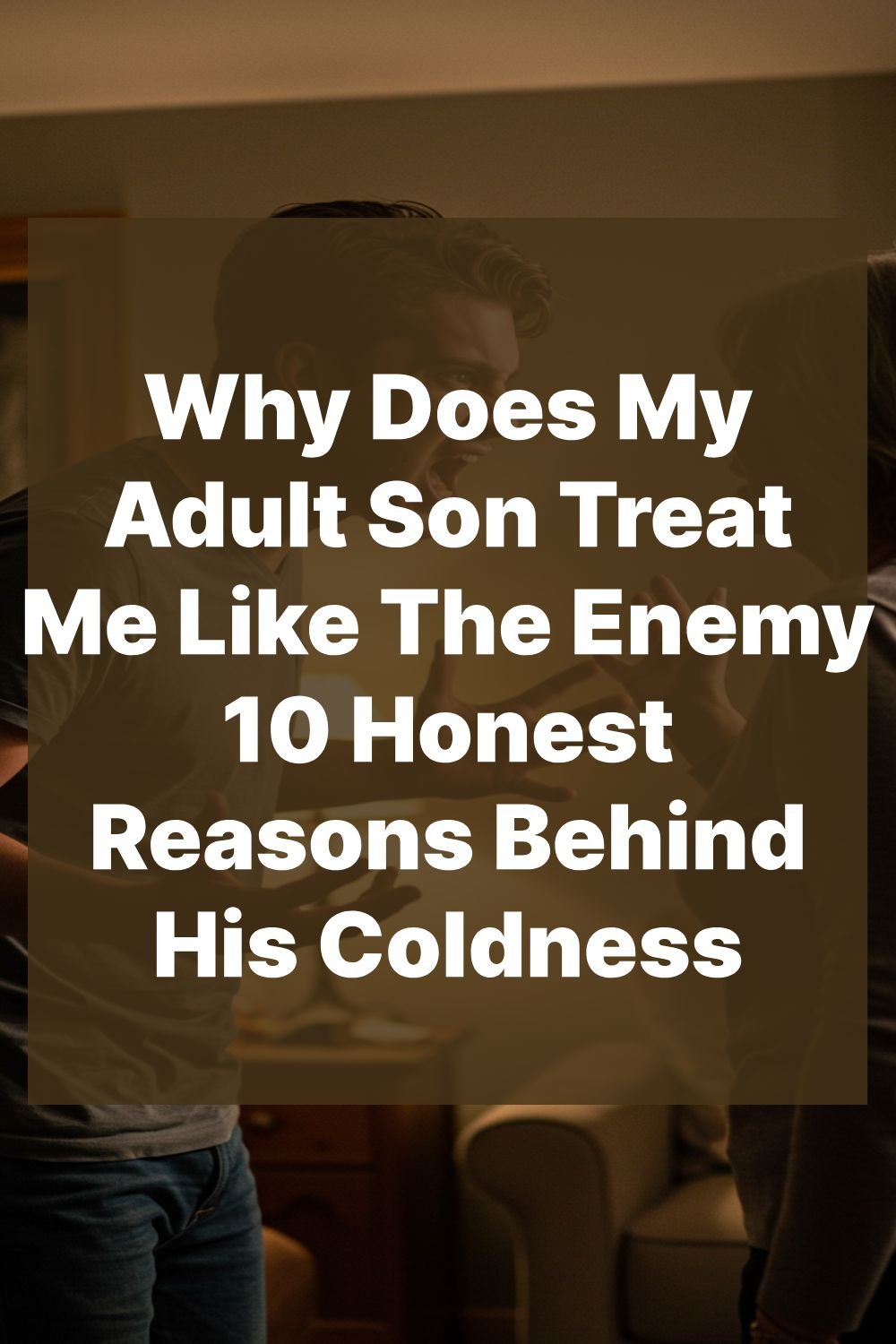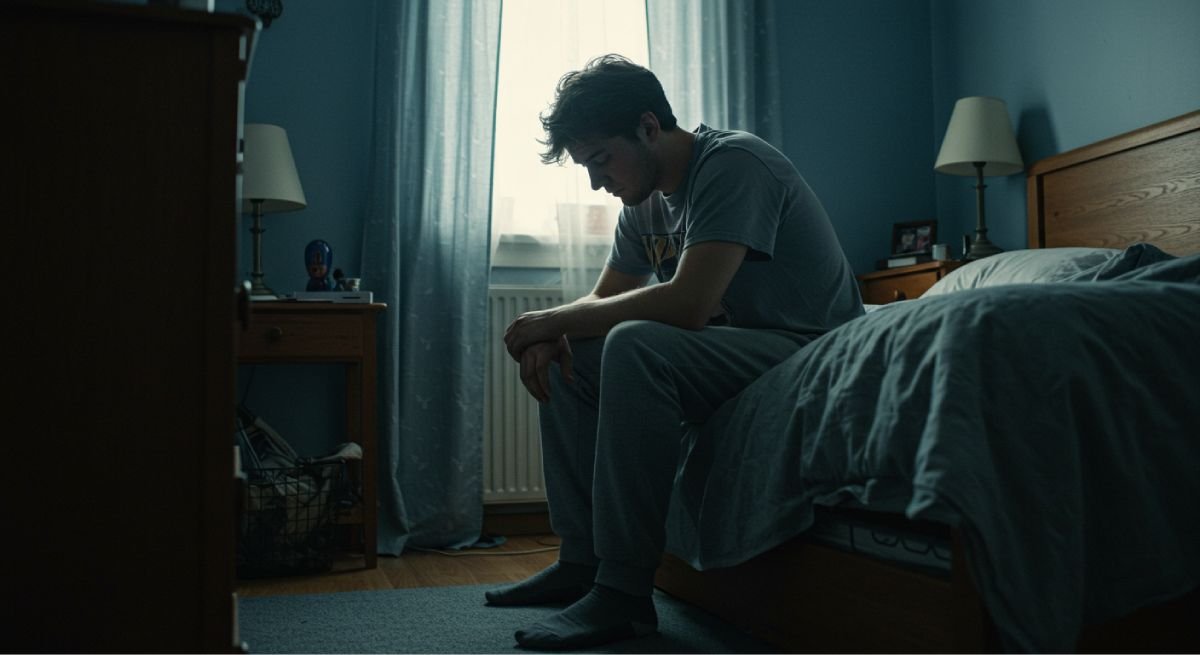
If you’re reading this, there’s a good chance your heart is heavy with confusion, sadness, or even guilt.
You raised your son with love, nurtured him through sleepless nights, kissed every scraped knee, and watched him grow into a man. But now, instead of closeness, there’s distance. Instead of warmth, there’s coldness. And sometimes, his words cut deeper than you ever imagined.
You’re not alone if you’ve asked yourself:
- “Why does my son act like I’m the enemy?”
- “What did I do wrong?”
- “Where did the sweet boy I raised go?”
The truth is, the mother-son bond is complex. It’s one of the deepest emotional relationships in life, but it can also be one of the most painful when it breaks down.
So why would a grown son turn distant, disrespectful, or even hostile?
Let’s explore 10 deeply honest reasons that might explain your son’s behavior—and what you can do about it.

1. He Felt Emotionally Neglected or Unheard Growing Up
Even if you did your best, your son may have grown up feeling emotionally neglected.
Maybe you were busy working multiple jobs or coping with your own emotional struggles. Perhaps you didn’t know how to create emotional safety for him because no one did that for you.
Children don’t always express these hurts, but they remember how you made them feel—invisible, unsupported, or unimportant.
As adults, unresolved wounds often resurface as anger, sarcasm, or emotional distance.
What to do:
Start by acknowledging his feelings without defensiveness. You might say, “I know I wasn’t perfect. I’m open to hearing what hurt you if you’re ever ready to share.”
2. He’s Struggling with Mental Health or Personal Stress
Your son may be fighting battles you can’t see.
Depression, anxiety, relationship issues, job pressure, or financial stress can make someone irritable and short-tempered—even with the people they love.
If your son feels ashamed of where he is in life, he might be projecting that shame onto you. Anger is often a mask for pain or insecurity.
What to do:
Don’t take his attitude personally right away. Check in gently. Say something like, “You seem stressed lately. If there’s anything you want to talk about, I’m here.”

3. He Feels Smothered or Controlled
You may still see your son as the little boy who once held your hand to cross the street, but he sees himself as a grown man who wants space.
When moms continue to offer unsolicited advice, make guilt-laden comments, or try to micromanage adult children’s lives, it can feel like an invasion—even if the intention is love.
Many sons respond with defensiveness or even cruelty, not because they don’t care, but because they’re trying to claim independence.
What to do:
Respect his boundaries. Ask before offering advice. Let him lead conversations about his life. Let him know you trust his judgment.
4. He Resents Past Favoritism or Comparison
If he felt like you favored a sibling or compared him unfairly, that pain may still be lingering—even if you didn’t mean any harm.
Being constantly compared or overlooked creates wounds that many children carry into adulthood. Resentment grows silently, and eventually it poisons the parent-child bond.
What to do:
If this applies, take ownership. Acknowledge it. Say something like, “I know I may have made you feel less seen than your siblings. That was never my intention, and I’m sorry.”
Even a late apology can soften a hardened heart.
5. He’s Angry About Childhood Trauma You Didn’t Prevent
Was your home chaotic when he was growing up? Did he experience abuse—emotional, physical, or otherwise—that you didn’t protect him from?
Even if you were doing your best or didn’t know, your son may still carry anger toward you for not shielding him.
Many adult children struggle to understand why their parent didn’t intervene. This can create distance, bitterness, or even outright hostility.
What to do:
If he’s opened up about a traumatic experience, listen without defending yourself. Don’t say, “I didn’t know” or “I did what I could.” Instead say, “I’m so sorry that happened to you, and I wish I had done more.”

6. He Was Treated Like Your Emotional Spouse (Emotional Incest)
If you were a single mom, it’s understandable that you leaned on your son emotionally. But there’s a fine line between close and too close.
When a mother treats her son as a surrogate partner—venting adult worries, needing constant attention, or placing him above all else—he may feel emotionally burdened.
As he grows older, he may try to create distance by acting mean or distant.
What to do:
Respect his autonomy. Let him have a life outside of your relationship. Consider speaking to a therapist about forming healthy emotional boundaries.
7. You’re Not Respecting His Life Choices
Whether it’s his job, lifestyle, religion, or romantic partner—if he feels judged or constantly criticized, he’ll begin to pull away.
Even if you’re only expressing concern, it can sound like disapproval or rejection. And when a son feels like he’ll never measure up in his mother’s eyes, he may start acting cold just to protect himself.
What to do:
You don’t have to agree with every choice he makes—but respect it. Say, “I may not understand everything, but I want to support you as the man you’ve become.”
8. He’s Trying to Establish His Own Identity
Sometimes, sons act distant or even rude to push back against their identity as “mommy’s boy.”
Especially if they were very close to you as children, they may feel an intense need to separate and define themselves as men. This process can be messy and emotionally painful.
He may reject parts of you—not because he hates you, but because he’s trying to become himself.
What to do:
Give him room to grow—even if it’s uncomfortable. Let him be his own man. In time, many sons return to a softer connection once they feel secure in who they are.
9. There’s a Rift Caused by His Romantic Partner
If your son’s partner doesn’t get along with you, he might be caught in the middle—and taking it out on you.
In some cases, partners feel threatened by close mother-son bonds and push for emotional distance. In others, the son may be trying to keep peace in his relationship by putting emotional walls up with you.
What to do:
Don’t compete with his partner. Focus on maintaining a healthy, respectful relationship with your son. Never force him to choose.
10. You’re Still Trying to Parent Him Like a Child
It’s difficult to transition from being a mother to an adult son, but continuing to treat him like a child only pushes him further away.
Grown sons want respect, autonomy, and to be seen as equals.
If you’re still using the same tone, control tactics, or guilt trips from when he was a teenager, he may be rebelling in harsh ways just to feel free.
What to do:
Shift your role. Treat him like a peer, not a project. Offer your love freely—without control attached.
Final Words: You’re Not a Failure
If your son treats you like the enemy, it doesn’t mean you’re a bad mother.
It means something went wrong in the bond that needs healing, attention, and mutual understanding. Relationships evolve, and so can yours.
Here are a few steps you can take right now:
- Reflect honestly: Have I hurt him unintentionally? Have I listened more than I’ve spoken?
- Apologize when needed: A sincere apology goes further than advice.
- Back off where necessary: Let him miss you. Let him come back when he’s ready.
- Seek help: Family counseling can create a safe space for healing.
- Don’t give up hope: Even distant sons often come back around—especially when they feel seen and respected.
Love doesn’t stop hurting just because your child becomes an adult. But with patience, humility, and compassion, you can begin to repair what’s been broken.
You’re still his mother. And deep down, he knows it.
Because your marriage is worth it. And so are you.




